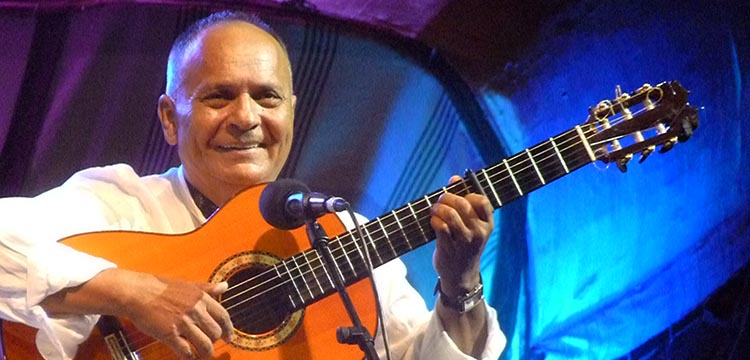62nd POTAJE GITANO DE UTRERA
Saturday, June 30th, 2018. 1030pm. Colegio Salesiano, Utrera
Tribute to Moncho
Voice: El Pele, Rancapino chico. “El compás lo da la tierra”: Macanita, Tomasito, Perico el Pañero, Inés Bacán, Tomás de Perrate, Luis de Chimenea, El Galli. Dance: El Farru, Pepe Torres, María Marrufo. Guitar: Pedro María Peña, José Galvéz, Antonio Higuero, Niño Seve. Rhythm: José Rubichi, Luis Monje, Chícharo, Macano.
Text & photos: Estela Zatania
All these people telling you cante festivals are washed up, outdated, an anachronism defended by a small number of nostalgic intolerant old-timers. But who’s going to come and flatten the hairs on my arms once they’re standing on end in reaction to certain moments when this happens without warning?
Well OK, there’s a certain amount of nostalgia, true enough…you remember great artists who are no longer with us, and your own long-gone youth and that early thrill of great flamenco. But it’s precisely flamenco which is the constant item that doesn’t let you down. There you are sitting in the immense athletic field of the Colegio Salesiano of Utrera where some two thousand people have gathered, each one with the wooden spoon they were given upon entering for the eventual consumption of the bean stew “potaje”. We’re seated at large round tables awaiting the emotional charge regularly provided, courtesy of artists like El Pele, Rancapino chico, Macanita, Tomasito, Perico el Pañero, Inés Bacán, Tomás de Perrate, and Luis de Chimenea’s group with some outstanding collaborations.
Rancapino “chico” isn’t that “chico” any more, in face, he’s a commercial and artistic success, knowing how to be and when and where to be it. Soleá and alegrías, a voice that’s velvet made into sound, always without cloying. Alonso is the current flamenco boom, and there didn’t even used to be booms in flamenco. He shouts with delicacy…how do you even do that? Doling out inspiration and pseudo biographical geographic verses. Malagueñas and sweet-sounding bulerías dedicated to the much-missed Gaspar de Utrera, and Antonio Higuero uses the strings of his guitar to slice the air into compás-sized portions.
The group of Luis de Chimenea was a series of separate performances accompanied by Higuero and Lebrija guitarist Pedro María Peña, musical director of the group. In addition to Chimenea, Perico Pañero sang styles of classic singers, dressing-up his bit with some fabulous dance moves. Tomás de Perrate and Inés Bacán charged the atmosphere with their dense nutritious singing, far far far from all superficiality.
Macanita arrived to light up the audience with her Fernanda-inspired soleá singing and her warm flamenco voice that also works for conjuring up a Paquera sound.
In the dance department, María Marrufo was competent, Farru orbitted at high speed and Pepe Torres from Morón triumphed with his subtle balance that reminds you of the elegance of Rafael el Negro and the power of Farruco Viejo.
The traditional tribute offered during the intermission, was for the Catalonian bolero-singer, Moncho. Various authorities spoke, including Chiquetete, honoring the beloved singer who, visibly moved, accepted various trophies, explained he’d been ill and touched everyone present with two brief songs.
The megastar of the night was Manuel Moreno Maya. Some time ago he took off for Planet Pele where everything, absolutely everything is possible. That kind of expansive freedom could result in disaster in lesser interpreters, but maestro Pele’s work is based on knowledge, fine instincts and life experience that sends him, infallibly and without detours, on a direct route to the flamenco objective. The singer took the liberty of accompanying himself, with a powerful Morón sound for a bulerías song. Young Niño Seve gave perfect fresh flamenco accompaniment for all the rest. An original alegrías song, and his trademark tangos “Vengo del Moro” with violin triggered applause, cheers of “ole!” and a standing ovation. What works works.
A drawn-out fiesta finale, our plate of bean stew and we headed home spiritually and emotionally richer than when we had arrived…no small thing.
